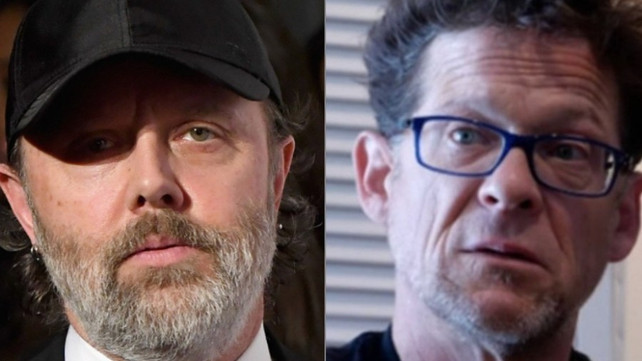Jason Newsted Speaks on How ‘Absorbed & Engulfed’ Lars Ulrich Behaved During Metallica’s ‘Black Album’ Creation
“First of all, we’re going to give credit to Lars,” Newsted said.

During a conversation with Bill Burr, former Metallica bassist Jason Newsted talked about the band’s monumental 1991 self-titled album, also known as the “Black Album.”
Asked about the record’s longevity and continuous success, Jason replied (transcribed by UG):
“Many elements. First of all, we’re going to give credit to Lars [Ulrich, drums] for being so absorbed and engulfed in the whole thing.
“And the sequencing of the record, and the sequencing of all the Metallica albums as they’ve come out, and the sequencing has become more developed and got better and better.
“Like, ‘The second song has to be that, and the seventh song has to be that,’ and so and so.
“And that’s why it’s appealing like you’re talking about, and listenable in that way because of his meticulous attention paid to that.
“And still, to this day, he is that guy, and so that credit should be there first. And going back to what was it like – did we know what was happening when it was happening?
“We had a lot of momentum built up and like we were mentioning before, those hundreds of shows and stuff, and building the fan base, and [1988’s] ‘Justice’ being so successful and kind of building, building, building on that…
“We knew there was a lot at stake and sort of the powers that be, the management and so forth, and everybody threw a whole bunch of money into it.
“So we know that when that much money is invested that, there’s a big chance of something really happening because people are going to put all the puzzle pieces in place and set us up for success.
“If we’re able to knock that shit down, show by show, and make people want to come back and want more, then we do our part. We knew everybody else and their roles, and all those roles that there are, you’re very familiar with, in your business.
“So many different people from the guy that sells the record to the guy that helps us make the record, the crew guys, everybody in between, all those people doing their job to the best of their ability to make it successful.
“So all those elements got to kind of line up for that side of it to come up with the product and be ready to present the product.
“Then you have to have the thing about the demographic, and you’re speaking of the albums, ‘Back in Black’ was 1980, right?
“So you were talking about records that came in 1991 – there was ‘Appetite,’ and a Soundgarden record, Nirvana, and Metallica…
‘Appetite’ was ’87.

“OK, ’87, but then the big year that came up was Guns N’ Roses did their double record [‘Use Your Illusion’], and Nirvana, Soundgarden… All were released in three months.”
What was the big place that either you always wanted to play, or all of a sudden, one night you were there and you never even dreamed to play in there because it was so big? Did you have any of those?
“I think early on, the Rose Bowl, when we did Monsters of Rock in 1988 with Van Halen headlining. The bill goes – Van Halen, Scorpions, Dokken, Metallica, Kingdom Come from the top down.
“So we come on after Kingdom Come at 3 o’clock in the afternoon, it’s 112 in the fucking shade, and there are already 60,000 people inside the bowl.
“And as soon as we came on, it flushed like a toilet, everybody came down from the seats onto the floor, and then took all the seats off the floor, and they passed them over their heads in bunches. We had to stop in the middle of ‘Whiplash’ and wait for all the chairs to get down.
“There was a giant pile behind the stage, like a pyre, getting ready to burn this big pile of all those metal chairs. But they would come up in sections of four and you’d see them fly over people’s heads, and people get knocked, and try to catch them.
“It’s overwhelming for all the guards in between the stage and there. So finally, we’re standing back and watching the crowd do this, they get done, they give us the green light again, we go right back out and whatever it was, the third verse of ‘Whiplash,’ one, two, three, where we left off.
“And so they had by that time cleared the space for them to do what they wanted to do. So there were 60,000, whatever it would have been on the floor, maybe 50,000 on the field, as it were, and pits were six or eight hundred people at a time, five or six pits across the whole field, just madness.
“It was being invented and pioneered.”
Was it scary? Was it amazing? What are you thinking when you’re standing there? Are you worried like, ‘Oh, no, our fans are destroying this… Is this going to affect future shows?’ Are you just sort of standing there like a bystander? How do you keep playing the song while you’re watching that staying focused?
“There’s the thing, so you know how your head has to be on a swivel? And there’s with police officers, or football players, hockey players, wrestlers, I mean, anybody, anybody in life driving the head got to be on a swivel.
“Well, it’s like that to the oomph. The main thing about playing successfully in an ensemble is knowing what’s coming next. You got to know that’s the verse and where you are, and boom-boom-boom.
“You do 30 songs over two and a half hours, and they all got to be just like that and not miss a fucking note. You got to know what’s coming.
“So that’s all going on as your demand, or whatever, your role, and then you got all this other shit happening – hey, there’s some boobs, hey, there’s some blood, hey, there are some bone points sticking out… So you really got to keep your mind in the game.”








